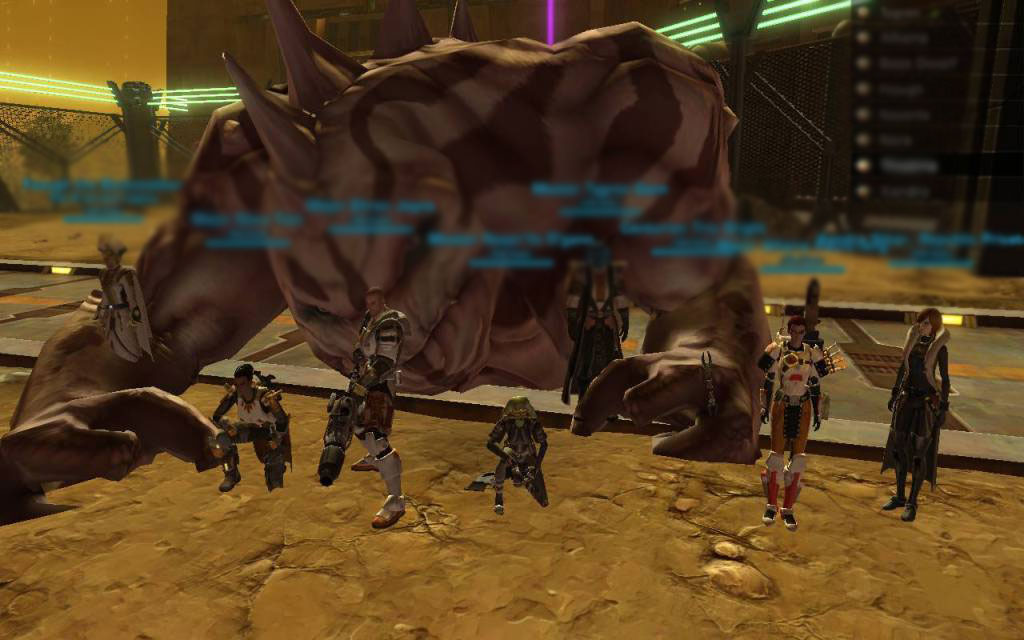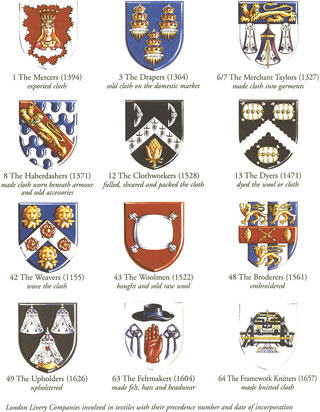Posted by Lady Republic in Council Chambers | 9 Comments
Council Chambers: No “I” In Guild
 Council Chambers is all about the ins and outs of guild leadership in Star Wars: The Old Republic. Each week, we’ll look at running and managing a guild through good times, bad times and everything in between.
Council Chambers is all about the ins and outs of guild leadership in Star Wars: The Old Republic. Each week, we’ll look at running and managing a guild through good times, bad times and everything in between.
First, let me say – from a spelling perspective, yes of course I know there is an “I” in guild. The title comes from the famous expression of, “No “I” in team” – we’ll overlook the fact that there is in fact a “me” there. Ahem.
Last week, we talked about the Guild Summit and what kinds of questions you’d maybe be interested in learning more about. While I got a lot of feedback about the game as a whole – which likely will not be addressed at the Summit, as it is specifically and solely about and for guilds – I’ll definitely keep my ears open for news on any of the topics our readers asked about, as well as doing my best to cover the event as a whole.
In the feedback and comments from that entry though, a very interesting – and sometimes passionate – debate ensued about what a guild actually is, what it should provide to its members, what its members should provide to it, and all those issues related to those things. It got me to thinking about this topic, and what guild membership really means to people. So this week, let’s look at what a guild actually is, and how that matches up to what players think it ought to be?
The Basics
On the most basic level, a guild is a social network and a chat line. In fact, in TOR as the guild system currently stands, one could argue that’s actually all it is. (More will be coming though, or so I hear!) There is no leveling system, guild bank, experience boost, special gear, even a device or logo to visually link members of the same organization. Now – there are ways that guilds can provide these things in game, but they do so by finding creative ways to implement them. For instance, a lot of guilds will provide assistance on flashpoint runs or helping to gear lower-level members; not quite the same as a true experience boost, but something that can definitely be helpful – especially when compared to the mixed bag of looking in general for a group. Other guilds implement primitive “guild banks” by rolling a low level alt and having that character store items for the guild members to request or contribute. In our guild’s case, we have a “guild bank” toon that the guild leader controls, and where we maintain a list of his current inventory through our forums. Nowhere near as easy to use as a true in-game guild bank, but better than nothing. However, all of these features require the assistance and cooperation of the players. They are not provided by the game mechanic itself.
The Advanced
Other gaming systems provide a lot more benefits to guild members than just the basics of a social network and community. Many games include features such as guild housing, which is typically some sort of instanced area available only to guild members, or guild banks, where members can store, donate, or retrieve useful goods and access can be controlled by rank. In other systems, there are guild quests, where guilds get extra perqs or rewards for completing them – this can be extra experience or money awarded to members, or to the guild itself, or tokens used to buy guild rewards. Finally, some systems have a guild leveling system, where members gain special advantages and benefits to their character from the guild’s leveling system. These can include benefits to individual members such as a shorter quick travel cooldown, higher rates of return on gathering professions, extra experience leveling, or unique gearing or vanity items that they can purchase for their characters.
What’s Good For The Guild…
Herein lies the rub: last week, I wrote specifically about the way in which a combination of a guild leveling system and a guild finder tool really devastated a lot of guilds. That led to a lengthy discussion among readers about whether these features – which do seem to advantage the individual player over the guild itself – are good for the game or bad for the game overall. It brought up some very interesting points worth considering in further depth. So, let’s take a look at some of these:
Guild Finders Are Good: The up side to these tools is obvious – for players that do not care to participate in server forums, official forums, or other out-of-game guild search tools, this makes finding a guild very easy. Just open up the guild finder tool, enter in some details, and poof! You may have hundreds of guilds to search through and find one that works, all without ever having to leave the actual game window.
Guild Finders Are Bad: The down side to these may be a little less obvious – and for that matter, may only be a down side to guild leaders and members really looking for other committed participants. By making it so easy to find guilds, it becomes a lot easier to leave a guild and keep hopping until you find one that makes you happy. This may be a good thing for the individual player, but it can be devastating for guilds. The frequent turnover can hinder Operations progress as groups struggle to fill slots, hurt morale for the members that stay, or just prevent people from really getting to know each other if it seems like people don’t stick around very long.
Guild Leveling Is Good: The best argument in favor of these are that they – and presumably the rewards they provide players – give players more options, which is always a win. Who would ever say that having to wait longer for a quick travel or taking less damage from dying is a bad thing, right? Players like presents, and like that sense of accomplishment that comes from unlocking something challenging; offering additional incentives through a guild leveling system just adds to that feeling and theoretically offers solo players or non-guilded people a reason to consider joining a guild.
Guild Leveling Is Bad: Now, I’m speaking as a guild leader here – so take what I say with a grain of salt. However, having some real life friends that are serial soloists and really don’t care to engage in the social experiment of guilds at all, I dislike the idea of creating a system where players are passively punished for not joining a guild. If you don’t want to be in a guild, you shouldn’t have to be – and when it comes down to getting increased gathers from being in a guild versus solo, well, that really pushes even people who dislike guilds into joining one, if only for the benefits. If you don’t enjoy the grand social experiment of a guild, it’s better to continue flying solo; being forced to join something a player doesn’t really enjoy is bad for both the player and the guild they join.
A Better Way
It seemed liked a lot of people agreed that having some sort of guild perq is helpful for guilds and players. However, it’s the form of that perq that takes careful effort and thought. As a few people suggested, guild perqs should be something that doesn’t create incentives for a player to join and participate, then leave or go inactive once they have the item/perq in question (for instance, heirloom gear). Rather, they should provide things that help both guild and player – so for instance, providing a rally point or guild summon that enables you to bring the guild, or guild members in an Ops group, to a specific place en masse is a great feature that benefits both guild and player.
The Real Question
The real question here ultimately boils down to, “What is a guild”? A lot of the responses seemed to break down along one of two lines. One is the “A guild is there to serve the player”, and the other is the “A guild is there to be served by its players”. The answer to that question seemed to shape a lot of commenter perspectives on the merits or flaws of all the other guild incentive systems. For those that believe a guild is there simply to serve its members, then all of the issues raised with guild leveling systems, member inactivity, problems with perqs, and all of the concerns raised shouldn’t matter. The guild is there to meet player needs, and they do so through levels and providing the player with goods. For the other school of thought, the reverse is true – members contribute time, effort, and energy into a team project and shouldn’t expect to gain personal profit outside of the ability to participate in team activities and reap the rewards from that. (In many games, guilds provide the best opportunities for advanced raiding and the rewards from that because of the coordination element.)
If you compare these ideas to real life, it’s a fairly interesting dichotomy. Some people view guilds like a team sport – along with all of the, “No I in team” philosophy and emphasis on being part of the group rather than more special than the others. If you’ve ever been in a team sport, or for that matter in the military (because drill sergeants love to emphasize your very particular lack of “being special”), then you’re already familiar with this mindset – love it or hate it. There’s a reason it is there though, and not just to beat up on individual self-confidence. Creating the idea of being part of a greater entity creates a lot of loyalty and devotion to your other members in the team/unit/squad/etc – even the ones you don’t like. Without that, there’s a good chance you might leave that jerk in your squad behind when you duck for cover in combat, or refuse to block a tackle for your quarterback if you think he’s an idiot. Part of the whole team concept (and in many cases, shared team misery) is to really develop and instill that idea of being in a group, all parts and pieces of the same organization – and specifically, fostering that willingness to help each other, even when you don’t necessarily like the other in question. If you’ve ever been in one of the teamwork guilds that does advanced operations or PvP, you’re probably familiar with this too – you take on tasks you might be ambivalent about or not happy about, in order to better the group and help attain the group’s success. In games like TOR, this might mean sitting out on a raid so someone else can go, or respeccing to a role that wasn’t your first choice because it’s what your guild currently needs. (In our case, see “tanks”.)
However, not everyone is comfortable with the idea of being just another spoke in the wheel. There’s a fairly significant perspective in the gaming community – and one that seems to be growing – that says if a player is already paying their subscription fee in the first place, why should they have to fulfill these teamwork requirements and not get more that directly benefits them? In this mindset, guilds are there in the game as just another way of providing more features, options, and services to members, rather than the other way around. Especially in a game context where Operations or raids have become pick-up-group friendly and this content is no longer exclusive to guilds only, more and more players are expecting more from their guilds than just a place to raid. Even moreso, they’re willing to give less to get the same gains that for them, they can earn in a pick up group without all of the additional work or baggage. So in this viewpoint, team isn’t good enough – guilds need to earn members and provide for them, not just take what the members can give for the team’s effort.
What do you think? What should guilds provide, when it comes down to it? Are they social entities to provide friends and folks to talk to or hang out with while playing? Should they be providing specific, in-game benefits to members? What is reasonable for a guild to expect from its members? Tell us what you think a guild out to be and provide!
Leave a Reply
You must be logged in to post a comment.






I was very reluctant to join a guild at the start, I had a lot of offers but they were mostly from very experienced MMO players who wanted the same standard.
I was convinced I wanted to do PvE as well – I saw a load of videos on YouTube of PvP and wanted none of it!
This all changed when I finally relented and started replying this one chap who wanted to form a guild – I cannot begin to tell you how this has changed my view of a lot of things.
In my humble noob view, a Guild like the one I am in is there because I want to play this game with those people. It is an amazing game, I am now happily addicted but it would not be even half as much fun if it wasn’t for the ladies and gentlemen I’ve had the honour of beating up the Sith with! :D
If any one of us is having trouble – there will always be someone happy to come over, tease the hell out of you before helping you lay waste to the things being naughty in your sight!
I’ve now got a decent enough character that I can now go and help low level characters through various things.
We group together for silly nights, PvP, Flashpoints, create gear, swap advice on levelling etc you name it – there is always something to do if you have the time, if you can’t it is no bother.
I don’t do this because I have to, I do this because I want to – that is what I think a Guild should be – even for the hardcore gamers – a group of people who you want to play the game with.
BLUE MILK AND CEREAL……where has it gone?
Good article btw. 8)
We had some staffing issues, and at the same time trying to make it more viable to come up with ideas! A lot of people miss it, and I’m thinking about how to bring it back as consistently as before!
Lethality 2 things 1 id be more than happy to do blue milk and cereal and 2 when do you play your smuggler. you never seem to be on.
I would suggest once a week with the poll. You just cant sustain it daily and have it be high quality.
ok ty i plan to do it at the most 4 times a week so I dont run out of ideas very fast.
Assuming you are able to find a guild where you like some of the people and can tolerate the rest, guilds inherently provide the benefit of easier grouping, where you can reasonably expect the participants to behave and expend effort (since they are not complete strangers you’ll likely never see again). So there is that.
I think game-supported benefits to being in a guild is an almost universal boon, where the drawback of leaving the solo artists out in the cold can be circumvented by not having draconian restrictions on forming a guild. It may then take that one-man guild a long long time to earn, what the bigger guilds can in an afternoon, but that can, I think, be liked to something about having and eating cake. They are not locked out, but by nature of their choice, will not benefit as quickly from what is essentially a group effort they are trying to solo.
Benefits should be quality-of-life, in my view. Things like shorter quick-travel cooldown is good. A passive damage buff is not a good idea, because then you start indirectly penalising the non-guilded directly on their gameplay performance. Even if the game is balanced around you not having this buff, it’s a niggling annoyance for someone who just lost a close match, that if only he had that extra tag to his name, he might have won.
What a guild can expect from its members is a tougher question to answer in the general case. It is tied to what the guild can provide for them: If the guild organises Operations, then the price of admission could reasonably to expect the members to educate themselves in strategies and toss some potions into the guild bank when they have some spare, rather than selling them. A social guild that exists just to have someone to chat with as you play, will have a harder time justifying certain member activities, especially if those activites require giving up in-game assets (gold, gear) or performing tedious tasks like farming mats.
Personally I expect a guild, whatever their mission, to at the least provide helping hands for group content. Dungeons, if not operations. Guild leadership should encourage, and perhaps enforce on pain of /gkick, this willingness to help out. I don’t think game supported benefits, like better gathering results, will interfere with this goal. You may have some people in your guild just along for the buffs, at which point it is up to the guild to decide whether to kick them or adopt a live-and-let-live approach. Even someone who is only in the mood for group content every other week, is still a warm body when the mood does strike him.
As matter of fact there is an i in guild. Right in the middle! i am sure it’s misunderstanding though :P
sorry. i had to say it anyway ;)